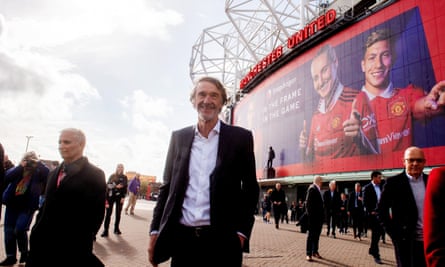Provided Sir Jim Ratcliffe gets the expected approval from Manchester United’s board this week, for the premium cost of his 25% stake – £1.3bn prices the club at £5.2bn (approaching twice its £2.63bn value) – he will take control of what makes Manchester United the club it is: the sporting department. That is headed by the football director, John Murtough, and his appointed manager, Erik ten Hag, so could their futures be in doubt? Another question is what authority Ratcliffe will actually wield. Whenever a material change is desired will he be stymied by the Glazers, who remain in overall charge, or is his power to be contractually baked into the 25% holding? If the latter, a clue regarding how United’s fortunes could be affected is found at Nice, who he bought in the summer of 2019. Since then the French club, whose last league title was in 1959 and who have not finished as runners-up since 1976, have placed fifth, ninth, fifth and ninth, while they are currently second. Definitely expect him to make his own appointments – which may mean Paul Mitchell, Monaco’s sporting director until March, dislodging Murtough, or Sir Dave Brailsford, the director of sport for Ratcliffe’s Ineos, joining from Nice.
Where is the £1.3bn sourced from?
Ratcliffe is one of Britain’s richest people, so there may be a presumption that his own funds will be used to buy into United. But will they? The Failsworth-born businessman has not made himself worth close to £30bn by being foolish regarding the bottom line and he ensures any deal makes the best financial sense – for him. Borrowing the money is a possibility, then, in which case any profit generated from his stake may be used to service that debt rather than being invested in the club. That, though, would be a more positive model than Malcom Glazer’s 2005 leveraged buyout of United, which placed the club in about £500m in debt – a figure now close to £1bn. Sheikh Jassim bin Hamad al-Thani’s offer was a cash bid for 100% of United.
Where is Ratcliffe’s £1.3bn going?
In addition to the £1bn owed, United’s stadium is a crumbling embarrassment that requires pulling down and rebuilding or a state-of-the-art overhaul. The 70-year-old’s £1.3bn would be a tidy sum to go towards this – especially given he reportedly wishes to raise Old Trafford’s capacity to 90,000. But there is no guarantee the club will benefit from the cash. More likely is that it will be profit for the Glazers. If so, where will the money come from to extend the seating from 75,000? Regarding United’s training base at Carrington, also a cramped hotchpotch that requires a revamp, the same question applies.

Ratcliffe visiting Old Trafford earlier this year. Photograph: Peter Byrne/PA
What does Sir Jim’s arrival mean for the six Glazer siblings?
Between them Joel, Darcie, Avram, Bryan, Kevin and Edward control 69% of United. The club has A and B shares, and those of the latter owned by the Glazers have 10 times the voting power of the former. It is unclear whether Ratcliffe has agreed to buy a part of all six siblings’ holdings or, say, two of them out completely. The breakdown of their share is as follows: Joel has 21,899,366 B shares and 1,707,614 A for total voting power 19.11%; Darcie has 20,899,365 B and 603,806 A for 18.15%; Bryan 19,899,365 B for 17.23%; Avram 16,606,979 B for 14.38%; Kevin 15,899,366 B for 13.77%; Edward 15,003,172 B for 12.99%. ** Joel, the de facto lead Glazer, is in contact daily (often several times) with Richard Arnold, the CEO, Murtough and other members of the hierarchy. But, in future, will Murtough and Ten Hag report directly to Ratcliffe?
Who will vote on whether to accept Ratcliffe’s offer?
The 12 members of United’s board: the six Glazers plus Arnold, Cliff Baty (chief financial officer), Patrick Stewart (chief legal officer and general counsel) and the three independent directors, Robert Leitão, ** Manu Sawhney and John Hooks.
How will fans receive the multibillionaire?
The long term will judge whether Ratcliffe can prove popular with supporters because, in the short term, he may be viewed as a man who, having lined the Glazers’ pockets, is the Americans’ patsy. But the Englishman’s end game is, apparently, to become the owner, which would mean the end of the Glazers running United – the dream scenario for the sizeable constituency of fans who detest them. The decade since United’s last championship has been a farce of transfer missteps (Ángel Di María and Paul Pogba to name but two), middling managerial appointments (David Moyes, Louis van Gaal, José Mourinho and Ole Gunnar Solskjær) and the acceptance of fourth place (because it means Champions League qualification). Sir Jim, then, hardly has a high bar to improve on.



